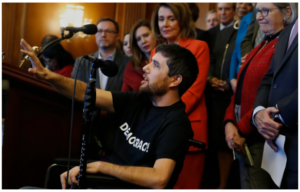How Medicare Advantage Could Kill Medicare
By Ady Barkan
MAY 17, 2023

Today, Senator Bernie Sanders, Representative Pramila Jayapal, and Representative Debbie Dingell introduced the Medicare for All Act in the Senate and House. They are part of a long tradition.
For nearly a century, elected officials, pushed by progressive reformers, have tried to guarantee the right to health care in America. They came close to success a few times: during the New Deal, when health insurance was initially part of the proposal for Social Security; in the aftermath of World War II, under President Harry Truman, who made a national health plan his top domestic priority; between 1970 and ’74, when even President Richard Nixon was open to compromise on a plan that would ensure universal health insurance coverage, but well-intentioned congressional Democrats held out for a single-payer plan and ended up with nothing; and in 2009–10 when we were a few votes short in the Senate of winning a public option as part of the Affordable Care Act.
The most recent push to transform our cruel, ineffective, and wasteful health care system has been led by Senator Bernie Sanders, especially through his 2016 presidential campaign, when he helped push the idea of “Medicare for All” into mainstream political discourse. Medicare for All is a proposal for a federal universal health coverage program that would expand the benefits under the current Medicare system to include dental, vision, hearing, and long-term care, and guarantee quality health care to all Americans with no premiums, co-pays, or deductibles.
By 2019, Medicare for All had gained significant momentum Democratic circles—Sanders’s early front-runner status forced every Democratic candidate to outline plans that would, in one way or another, cover everyone in the country. The House of Representatives announced that it would hold its first-ever hearing on the Medicare for All Act. I texted Speaker Nancy Pelosi and asked if I could testify, and a week later I was the first witness in the overflowing Rules Committee room. I spoke through my computer; paralyzed by ALS at age 35, I embodied the reality that we all will need health care, no matter how lucky and privileged we feel.
“Our time on this earth is the most precious resource we have,” I said then. “A Medicare for All system will save all of us tremendous time. For doctors and nurses and providers, it will mean more time giving high quality care. And for patients and our families, it will mean less time dealing with a broken health care system and more time doing the things we love, together.”
As the Democratic presidential primary heated up, my organization, Be A Hero, partnered with the National Nurses Union to orchestrate a video series in which I interviewed six of the leading candidates, about the problems that ail our health care system and their visions for curing them. After he secured the nomination, Joe Biden agreed to sit down with me, and although we didn’t agree on everything—he doesn’t support Medicare for All—we agreed on enough that he invited me to speak about health care during the 2020 Democratic National Convention.
I had become a prominent champion for universal health care, particularly for strengthening and expanding Medicare. But I am now embarrassed to admit that I actually didn’t understand the massive changes that had been happening to the Medicare system. For more than two decades, health insurance corporations have been privatizing our cherished Medicare program. Now, I’m worried that once they have it we may never get it back.
About 25 years ago, Congress created Medicare Advantage—a program that allows private insurance companies to offer Medicare coverage and to be paid by the federal government for each person that they insure. And this month, we hit a critical threshold with more than 50 percent of all people on Medicare enrolled in one of these private plans. The Medicare Advantage program was created with the promise that the private sector could reduce costs by better managing care. But, as The New York Times reported in October—which is when I finally understood the scale and gravity of this problem—the hunger of health insurance corporations for profits that these plans supply has been insatiable. By abusing the system, including by making patients look sicker than they actually are, companies offering Medicare Advantage plans are being overpaid by taxpayers by at least $23 billion every year. The program is more costly than traditional Medicare, not more efficient.
We are talking about huge sums of money. The government pays insurance companies $400 billion every year, which is half the size of our military budget. Medicare Advantage is such good business that Humana, the country’s third-largest health insurance provider, announced recently that it is getting out of the employer-provided insurance business so that it can focus on growing its Medicare Advantage market.
[READ FULL ARTICLE HERE]
